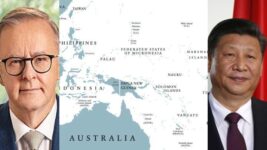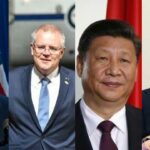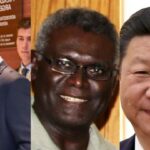Canberra and Beijing Scramble for Security Influence in the Pacific

New foreign affairs minister Penny Wong on Wednesday set off on the second leg of her diplomatic tour of Pacific nations with the aim of smoothing over the animosity that’s built up after Morrison government neglect.
Wong paid a visit to Fiji last week, while, at present, she’s taking in Samoa and Tonga. The Pacific is a priority for the recently sworn in minister, as during the election campaign, the Chinese government established a security deal with the Solomon Islands to the chagrin of our nation.
The Labor Senator’s Pacific trip coincides with that of her Chinese counterpart Wang Yi, as both nations vie for influence in a region that’s becoming of increasing strategic significance as Beijing pushes for a stronger presence, which Washington and Canberra want to prevent.
The United States and Australia accuse Beijing as threatening stability in the Indo-Pacific and posit that its attempt to gain stronger ties with island nations is a clear sign of this. However, China asserts that Canberra is ultimately doing the bidding of Washington in its renewed regional focus.
Wang’s 10 day tour saw him travel to eight nations with the aim of establishing bilateral economic and security relationships. But at a virtual meeting on Monday, the foreign ministers of ten nations rejected Beijing’s proposal for a new overarching regional security agreement.
Fiji PM Frank Bainimarama perhaps summed up the mood towards the onslaught of diplomacy in the region best, when he tweeted following his meeting with Wong that, “Fiji is not anyone’s backyard – we are a part of a Pacific family. And our greatest concern isn’t geopolitics – it’s climate change.”
Building tensions
Pacific leaders have been discouraged by our nation’s attitude towards the region over the last decade, as their countries have been suffering some of the greatest impacts of the climate crisis, and yet, the response of the Coalition government has been to prioritise further fossil fuel expansion.
Our nation’s deteriorating relations with the Pacific were exemplified in mid-April when the Solomon Islands entered into a security pact with Beijing. The agreement not only includes security, but it also brings great economic benefits to the island nation.
The Beijing-Honiara deal came after a year of heated exchanges between our nation and the US on one side and China on the other.
US president Joe Biden has been threatening to step in if the East Asian giant attacks Taiwan, and former Australian defence minister Peter Dutton pledged our nation to follow Washington into such a conflict.
The Solomons announcement sent shockwaves throughout Canberra, and indeed Washington, as the agreement potentially leaves the way open for China to establish a military base on the soil of the Pacific state, which would be less than 2,000 kilometres away from Australian shores.
The march to continues
Then in opposition, Senator Wong called the China-Solomons pact the “worst foreign policy blunder” since World War Two, which suggests that Labor is taking the same position as the Coalition on calling out an aggressive Beijing.
And so far, the actions of the Albanese government have reinforced this. The new PM’s first act in office was to attend a meeting of the Quad (Quadrilateral Security Dialogue), which is an alliance between Washington, Tokyo, New Delhi and Canberra, with rising China as its main focus.
This was further highlighted as Chinese premier Li Keqiang sent a letter of congratulations to Albanese on taking out the election and suggested it was a good time for the two nations to stabilise their relationship, to which the PM publicly responded, “It’s not Australia that’s changed: China has”.
Indeed, an op-ed appeared in Chinese Communist Party mouthpiece the China Daily this week that reflects on the choice the Albanese government now has as to whether to continue to act as a mediator for Washington against Beijing, or to take another course.
“The former means it will turn the country’s largest trade partner and major investor into a rival at the cost of the whole region,” author Li Yang concludes, “while the latter would raise Australia’s profile on the world stage, turning it from a US lackey to a responsible global stakeholder”.







